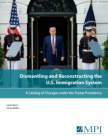Visa Policy
Recent Activity

Top legal scholars discuss the Trump administration’s substantial use of executive power to change the country’s course on immigration, how this compares to past administrations, and how the president’s role in immigration policy could be carefully considered and reimagined.

MPI and MPI Europe experts discuss the effects of the coronavirus pandemic on asylum systems in Europe and North America, as well as in developing regions, where 85 percent of refugees live. During this freeform conversation, our analysts also assess the implications for the principle of asylum and the future for a post-World War II humanitarian protection system that is under threat.

This MPI webinar brought together public health and migration experts to analyze the impact that COVID-19 preventative measures will have on vulnerable immigrants and refugees in Colombia and Latin America. Speakers also discussed how policymakers and international organizations can include migrant populations in their emergency response plans.

Governments are facing urgent pandemic-related questions. One of the more pressing ones: Who is going to harvest crops in countries that rely heavily on seasonal foreign workers? In this podcast, MPI experts examine ways in which countries could address labor shortages in agriculture, including recruiting native-born workers and letting already present seasonal workers stay longer.

This webinar, organized by MPI and the Zolberg Institute on Migration and Mobility at The New School, discussed migration policy responses around the globe in response to the COVID-19 pandemic, and examined where migration management and enforcement tools may be useful and where they may be ill-suited to advancing public health goals.






















Broad and Blunt, the Trump Administration’s H-1B Changes Miss the Opportunity for Real Reform
The Trump administration's changes to the H-1B visa program are the most significant in three decades, promising to end the practice of replacing U.S. workers with highly skilled immigrants. While the problems the administration has identified and the interest in protecting U.S. workers are legitimate ones, its approach may cripple the H-1B program itself, as this commentary explains.